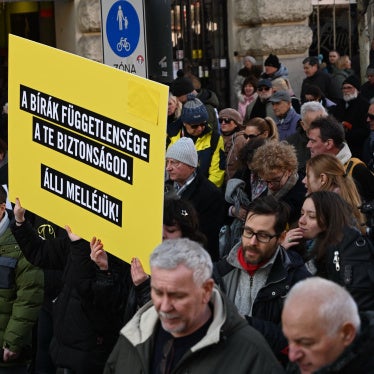Uzbek authorities should immediately release a dissident who was beaten by police and is now seriously ill, Human Rights Watch said today. The arrest was the latest in a series of police actions intended to chill public criticism of the government.
Police arrested Ergash Bobojanov, a member of the opposition movement “Birlik” (Unity), at his home in the Fergana Valley on February 17, 2003, in what appears to be a renewed crackdown against those who publicly criticize the government. According to human rights advocates in the Fergana Valley, eyewitnesses saw police beat Bobojanov during his arrest. Police took Bobojanov to the Fergana Pre-Trial Detention Center Number 10 and charged him with criminal defamation.
Human Rights Watch is very concerned for Bobojanov’s health. Bobojanov, who is in his sixties, was reported a week after his arrest to be in very poor health, suffering from constant convulsions and having difficulty speaking. He is believed to be a diabetic with heart problems.
“The Bobojanov arrest shows the Uzbek authorities’ intolerance of criticism,” said Elizabeth Andersen, executive director of Human Rights Watch’s Europe and Central Asia division. “And now this intolerance is endangering a man’s life.”
The charges against Bobojonov—criminal defamation (article 139 of the Criminal Code), revealing state secrets (article 125), and making death threats (article 112)—relate to two articles he wrote for Res Publica, a newspaper published in Kyrgyzstan, in 1999 and 2001. The articles, entitled “Bureaucracy of public servants is a danger to the government,” and “They demand that you pray for Islam Karimov,” were critical of the Uzbek government and raised issues of local government corruption.
In May 2002, Uzbek authorities announced the end of pre-publication censorship. The government, however, continues to use other means of control to restrict the media, which engage in heavy self-censorship to avoid criticism of government policies.
“When pre-publication censorship ended, some people thought this would lead to more diversity in the media,” said Andersen. “But Bobojonov’s arrest is among the latest in a series of events showing the authorities’ hardening attitude toward criticism.”
On February 22, police in Tashkent detained Oleg Sarapulov, an assistant to an independent journalist who publishes his material on the Internet. They held him for two days without access to a lawyer or family and friends. Sarapulov told Human Rights Watch that police questioned him about two articles critical of the Uzbek government in his possession and accused him of distributing these to others. The articles, by U. Khaknazarov and found on CentrAsia website, have become well-known in Tashkent since January for their critical commentary on the inner workings of the Uzbek government, including inter-clan rivalries and corruption. The site is blocked on most Internet providers in Uzbekistan.
According to Sarapulov, police planted on him leaflets of Hizb ut-Tahrir, an Islamic organization that calls for the establishment of a Caliphate (an Islamic state) in traditionally Muslim lands and whose activities are illegal in Uzbekistan. He told Human Rights Watch that an ongoing investigation could lead to criminal charges that he is involved in anti-constitutional activities.
On February 18, a court sentenced Ghairat Mekhliboev, a journalist, to seven years in prison for membership in Hizb ut-Tahrir. Mekhliboev had published articles in several Uzbek newspapers, including the mainstream weekly Khurriat. The court convicted him on charges of anti-constitutional activities (article 159), involvement in religious “extremist” organizations (articles 216 and 244-2), and inciting religious hatred (article 156). The verdict focused on his journalism, including an article published in Khurriat that allegedly contained Hizb ut-Tahrir’s ideas. The article was published in April 2001, when Uzbek newspapers were still under pre-publication censorship and highly unlikely to publish any materials contrary to government policy against unofficial Islam. Mekhliboev admitted in court that he had studied the ideas of Hizb ut-Tahrir, but denied that he was in possession of their materials. He also stated that law enforcement authorities beat him in custody.
“Prosecuting Mekhliboev may have been a way for the government to send a signal to today’s journalists not to overstep any boundaries,” said Andersen.







